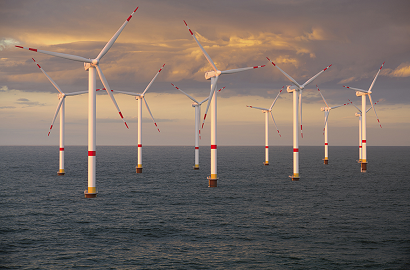Ørsted joins forces with Repsol to develop floating offshore wind projects in Spain

Both companies are committed to combining their experience to become leaders in the industry
The Danish firm Ørsted, which has three decades of experience in the development, construction, operation and ownership of offshore wind farms, has decided to enter the Spanish floating wind power market, and will be doing so in partnership with Repsol. The two companies have signed an agreement to identify and, where appropriate, jointly develop projects based on this technology in Spain, with the aim of becoming leaders in the industry.
Over the last thirty years, the company has primarily developed bottom-fixed offshore wind farms. Widespread in Northern Europe, this technology is not viable in Spain, as the water is deeper. Hence the agreement focuses on the development of floating offshore wind platforms, which also make it possible to install wind farms further away from the coast, and in areas with higher wind speeds.
Martin Neubert, Deputy Group CEO at Ørsted said, “We’re excited to join forces with Repsol to explore floating offshore wind development in Spain and to reaffirm our commitment to driving the commercialisation of this technology, which will extend the reach of offshore wind by enabling installations further offshore and in deeper waters.”
Significant portfolio of projects
Ørsted, which has already opened an office in Madrid, recently won its first contract for a floating offshore wind lease area off the coast of Scotland. Repsol has already made some headway in this technology too, as the company's Executive Director of Low-Carbon Generation, João Costeira, pointed out, “Having Ørsted, a world leader in offshore wind, as a partner puts us in a prominent position with regard to the future development of floating technology, an area where we are already an experienced player thanks to our participation in the Windfloat Atlantic project off the coast of Portugal.”
Ørsted also has a strong portfolio of onshore wind, solar, and renewable hydrogen projects. To date, the company has installed approximately 7.6 gigawatts of offshore wind capacity, 3.4 gigawatts of onshore wind capacity, and two gigawatts of sustainable biomass. To achieve its ambition of installing 50 gigawatts of renewable energy by 2030, the firm is looking to the seas around Spain, and to Repsol's experience as a supplier of energy from a variety of different sources.
The Spanish company has committed to renewable power generation as one of the cornerstones of its efforts to achieve decarbonisation. The installed capacity targets for 2030 were recently raised to 20 gigawatts, an increase of 60% compared to the previous target. By 2025, installed capacity will have increased to six gigawatts. To achieve this, Repsol will be investing 6.5 billion euros in low-carbon projects between now and 2025, rather than the 5.5 billion euros previously planned.
Small-scale testing
After several years of concept development and small-scale testing, floating offshore wind is now on the brink of commercialisation. Both companies say that they expect this technology to reach 21 gigawatts of installed capacity by 2035. The goal is to reach three gigawatts in Spain by 2030.
As Rasmus Errboe, Head of Region Continental Europe at Ørsted explains, “Spain has one of the world’s largest fleets of onshore wind and solar PV farms, and by the end of this decade Spain will also be producing green energy at scale from floating offshore wind farms. We very much look forward to working with Repsol, the country’s leading energy provider, to help accelerate Spain’s transition to renewable energy, while at the same time creating local jobs and investing in the Spanish supply chain.”




